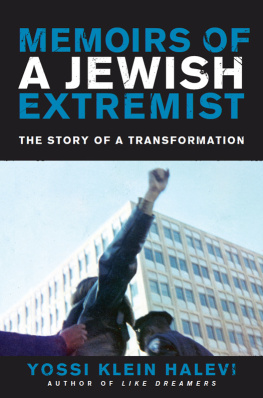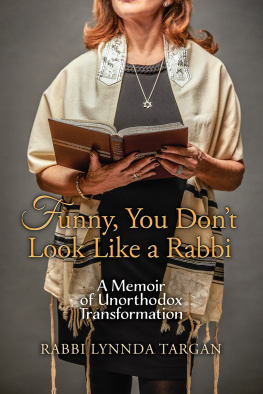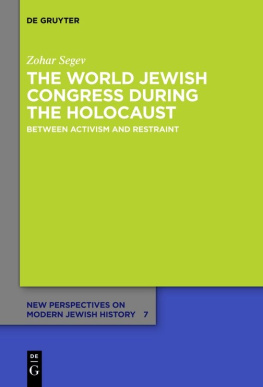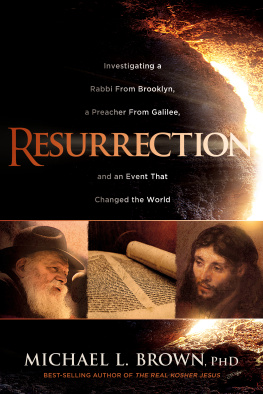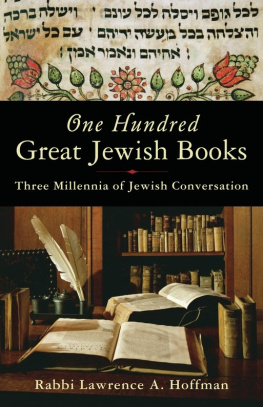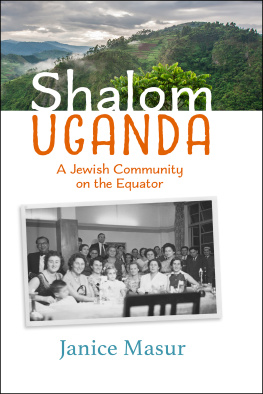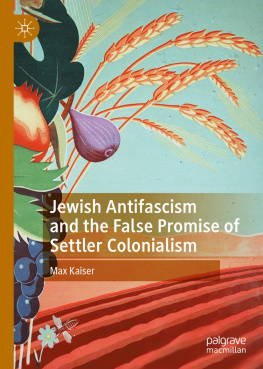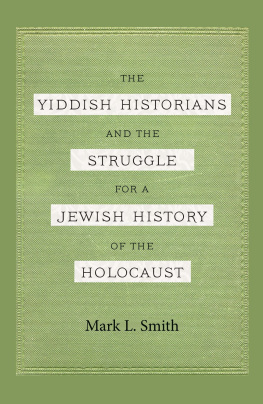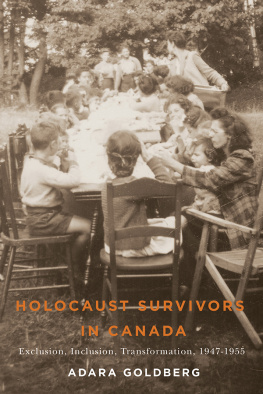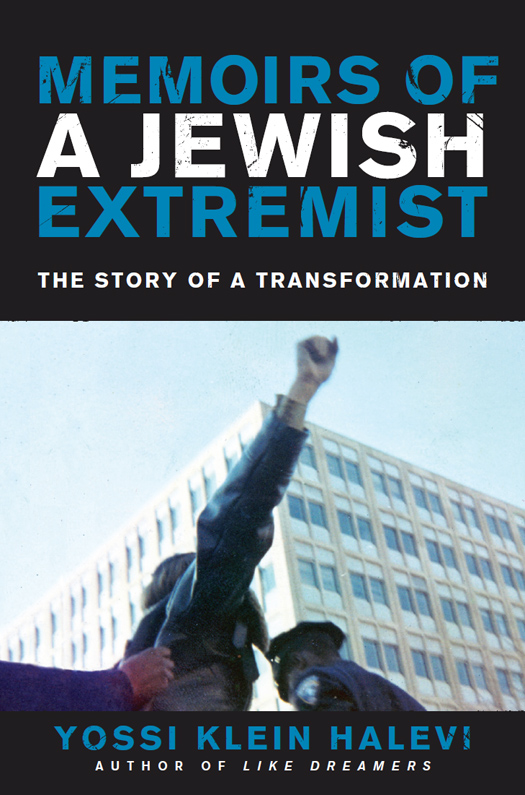FOR MY PARENTS, AND CHANI
CONTENTS
ONE
Planet of the Jews
TWO
Invisible Homeland
THREE
Summer of Love
FOUR
The Ecstasy of Rage
FIVE
Crossing the Border
SIX
The Whole World Is Against Us
SEVEN
Emancipation
A LL THE EVENTS and characters in this book are real. Some of the characters names, as well as some identifying traits, have been changed, especially those of former militants of the Jewish Defense League. Most now lead quiet and respectable livesvery different from their teenage years and the events described here.
T his book has had a strange history.
I began writing what would become Memoirs of a Jewish Extremist in 1972, at age nineteen. I was then immersed in the movement to free Soviet Jewry, and had drifted toward its radical wing, led by the late Rabbi Meir Kahane and his Jewish Defense League (JDL). I intended the book to be a defense of Jewish militancy. After abandoning the project and then returning to it two decades later, what emerged was a repudiation, rather than a celebration, of Jewish rage.
As if to confirm that message, Memoirs was released on November 6, 1995, coincidentally almost to the day of the assassination of Israeli Prime Minister Yitzhak Rabin, by a far-right Jew who had been influenced by Kahane.
Not surprisingly, the book received a good deal of media attention. This was, after all, the ultimate moment for Jewish extremism. Even though Memoirs focuses on American Jewish militancy of the early 1970s and its struggle to free Soviet Jewry, while Israels radical right was motivated by opposition to Rabins negotiations with the Palestinians, journalists needed some way to explain intra-Jewish fratricide, and this book happened to be there.
But for all the media attention, Memoirs reached only a limited number of readers. There was an understandable aversion, even revulsion, toward a book with the provocative title Memoirs of a Jewish Extremist in the immediate aftermath of the Rabin assassination. The original subtitle, An American Story, offered no hint about the books judgment on extremism. One Jewish owner of a Manhattan book shop told me, There is no way that book will appear in my store. I assured him that the book was about my break with the extremist mindset. I dont care what its about, he countered, I will not display that title. It was hard at that moment to disagree with him.
Still, Memoirs did find its devoted readers. Some were children of Holocaust survivors and former activists in the Soviet Jewry protest movement, grateful that their experience had been acknowledged. Others, not directly implicated in this story, were pleased to discover an account of a crucial chapter in American Jewish history that hadnt yet been told. A leading Jewish scholar, head of a liberal rabbinic seminary, confessed to me his fascination with the JDL. One reviewer, himself a former far-left Yippie activist, wrote how intrigued he was to discover a shared Sixties cultural experience with JDLers: Who knew that, beneath the yarmulke, they were just as crazy as we were?
Memoirs is at once my personal story and a generational story. It tells of a young American Jew, son of a Holocaust survivor, growing up in Brooklyn in the 1960s and early 1970sthe pivotal moment in which the contemporary American Jewish community was born. American Jews of my generation experienced a convergence of extraordinary historical forcesthe Sixties, the Six-Day War, the first tentative attempts to face the Holocaust, the movement to free Soviet Jewry. The result was the beginning of an American Jewish political and cultural renaissance, an eruption of pride and empowerment.
On the edges of that Jewish awakening emerged a small but vocal and occasionally violent group of young militants. The American Jewish community had never seen anything quite like it, and the militants were widely regarded as outcasts. But that radical fringe seemed to answer the question that obsessed me: How does one live as a Jew in this world after the Holocaust? I surrendered to the purity, the thrill of rage. What, after all, could be more noble than embodying the suppressed resentments of those wounded by history?
Gradually, though, I learned that the qualities we often regard as the best part of us turn out to be precisely those we need to overcome. Spiritual growth happens by challenging our most cherished assumptions, about ourselves and the world.
Some reviewers, apparently disappointed that I hadnt been involved in actual terrorism, noted that I wasnt really an extremist but a militant. In an age of terror atrocities, the extremism bar has been set dauntingly high (though the JDL was responsible for its share of outrages). Perhaps it is fair, then, to define the extremist of this books title as first of all a state of mind. The notion that victimhood, and the urgency of ones goal, bestow a kind of moral immunity encourages idealists to contemplate horrific acts. In that sense, all extremists, regardless of their cause, belong to the same camp. Tzedek, tzedek tirdof, commands the Torah: Justice, justice shalt thou pursue. The repetition of the word justice, note the rabbis, is to remind us that not only ends but also means must be just.
Inspired by the post-Holocaust Jewish renaissance, many young Jews of my generationin America, the Soviet Union and throughout the Diasporarejected assimilation and adopted a Jewish identity. My journey worked differently: from the heart of Jewish self-ghettoization to an attempt to make peace with the world, embracing not only my Jewish identity but also my place within humanity. For many Holocaust survivors and their children, being a part of humanity was by no means a given. The message of the war against the Jews, unfolding unimpeded for over a decade in the heart of Europe, was exactly as the Nazis intended: Jews were wholly other. Aside from the destruction itself, the wound that lingers in the Jewish psyche is the fear of exclusion from humanity.
My journey has been a quest for balancebetween particularism and universalism, Jewish identity and membership in the human race. The great internal crisis in Jewish life today is precisely a lack of balance between the particular and universal, the two essential components of a vital Jewish identity. One part of the Jewish people, abetted by Holocaust trauma, has barricaded itself in the most xenophobic aspects of Jewish tradition, while another part of the Jewish people has become so open to the world that it risks fading out of the Jewish story altogether. (Maybe wed be a healthier people if some Jews were a little more Jewish and others a little less so.)
My hope is that this book can convey something of the vitality of post-Holocaust Jewish identity for those searching for their place within the Jewish story. And I hope too that this book can help open worlds for those who come from a background similar to mine, and for whom Jewishness can be such an overwhelming experience that one risks losing a connection with the rest of humanity.
THIS IS ALSO THE STORY OF an American-born Jews love affair with Israel. I moved to Jerusalem in 1982 and have now lived in Israel longer than Ive lived outside it. Over the last three decades I have experienced a four-year terror war of exploding buses and cafes, two wars in Lebanon, a month-long assault on our cities by Saddam Husseins Scud missiles, and endless rocket attacks from Gaza. I have been a soldier and the father of a soldier. I have lived through the murder of an Israeli prime minister by a fellow Jew, seen the uprooting of settlements in Gaza only to be followed by even more missile attacks from Hamas across Israels international boundary. I have joined the agonizing debate among Israelis about occupation and security and morality, about what Jewish history expects of us now that we are back home.

